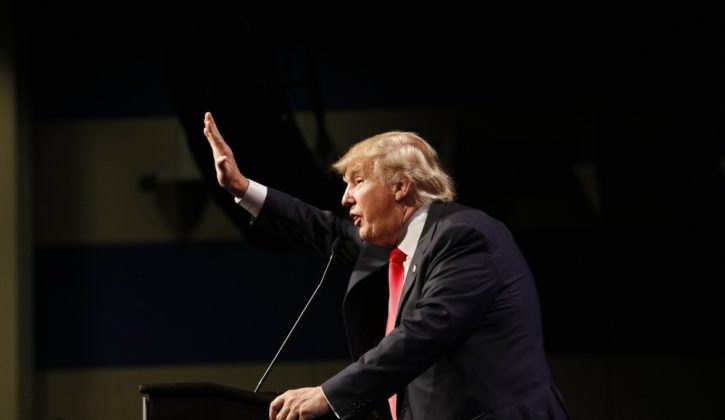Chances are, your kids have clued in, at least in some part, to the news this morning. They might be confused, hurt, angry, or afraid. And while the ‘why’ of this election is a difficult one for even adults to understand, there are many teachable moments here. It will not be easy to talk to kids about this, but it is necessary.
‘The reality is that your children—especially your pre-teen and adolescent-age children—will have probably come into an awareness of what’s happened and what’s being talked about. And it’s an ideal opportunity as a parent to have some very clear conversation about what your family value system is, and how we would act out on that family value system.’ Said Dr. Vanessa Lapointe, a registered psychologist and parenting specialist.
Here are some of the most important things you can talk to your kids about in the coming days.
Talk to them about voting.
Make it a family affair. Take your kids to the polling station next time you vote. Talk about how many states were won by a narrow margin. Make sure they understand that every vote counts—that their vote is their voice. Explain that the US, and Canada, are democratic countries where people vote for leaders, and it’s important to honour that.
Talk to them about social change.
I had a professor in university, who, on the last day of classes, in an effort to summarize over 100 years of American history to a roomful of Canadians, told us that the entire history of America boils down to different groups of people trying to get their rights.
It’s a statement that has resonated with me and one I’ll likely never forget. Rights and freedoms are fought for and earned through canvassing, campaigning, organizing, and often what feels like long, slow, agonizing baby steps. But that’s how change is made. It is a myth that it happens spontaneously, or that change comes quietly as new generations come of age. Assure them that there are many, many people in the United States who are going to fight for positive change.
Talk to them about bullying.
A fear that’s looming large and dark on everyone’s minds is that women, LGBTQ2, Hispanics and Latinos, people of colour, Muslims, disabled folks or anyone at all who enjoys less than immense privilege is now unsafe in the United States of America. Talk to your kids about bullies, about why bullies bully, and about what your kids can and should do when they see someone being ostracized, excluded, picked on, or hurt. If you feel your child is being bullied, reach out. (Here are six ways you can act.)
Assuage their fears.
Mass deportations. Building a fence. Grabbing them by the pussy. It’s not surprising but it is a terribly, terribly sad fact that lots of kids are scared for their safety and the safety of their loved ones. CNN’s Van Jones is drawing praise for his heartbreaking, succinct summation on election night of how difficult it will be to explain this to kids.
‘How do I explain this to my children?’ I have Muslim friends who are texting me tonight saying, ‘Should I leave the country?’ I have families of immigrants that are terrified tonight.’
Tell them in no uncertain terms that they will be safe. Leave any doubts about the veracity of that statement to adults. Reassure them. Tell them that there are many people, from their teachers and principals to family members, who will keep them safe. Tell them that there are many people in the world, and in America, who do not agree with the hurtful things Trump has said—and they will fight to make sure his talk of deportations and exclusion remain only that—talk.
Talk to them about your family’s values.
In the coming months, they may hear some less than pleasant things about people of differing abilities, skin colour, religion, and more. Make sure they know where you stand, and that the opinions of some do not necessarily reflect everyone else’s opinion. And let them know you will protect them.
Talk to them about consent.
In the wake of Trump announcing he would ‘grab them by the pussy’, the dignity of women and their bodies seems very much at stake. It’s always a good idea to talk to kids about personal space, and it’s never too early to talk to your kids about consent. Even small kids are capable of understanding that giving out or receiving hugs, for example, is their choice.
‘Even for very young children, having [a] conversation about what is your space and what is my space, and we don’t invite people into our personal space unless we’re comfortable with that, and we can refuse people access to our personal space.’ says Dr. Vanessa Lapointe.
Talk to them about resilience.
If your kids are particularly disappointed that America did not elect its first female president, remind them that the loss does not diminish the incredible achievement that was Hillary’s nomination as one of the candidates. Tell them that Hillary has been working hard for America for many, many years, and every time she has a setback, she rallies. Tell them that America’s first female candidate for President was tenacious, passionate, and hard-working, and that’s something to be admired and emulated.
[Updated January 20]
Tell them what Obama told his own kids.
‘…Your job as a citizen and as a decent human being is to constantly affirm and lift up and fight for treating people with kindness and respect and understanding. And you should anticipate that at any given moment there’s going to be flare-ups of bigotry that you may have to confront, or may be inside you and you have to vanquish. And it doesn’t stop … You don’t get into a fetal position about it. You don’t start worrying about apocalypse. You say, OK, where are the places where I can push to keep it moving forward.’ (via globalnews.ca)
Tagged under: politics,donald trump,hillary clinton,trump,Election 2016
Category: parenting






